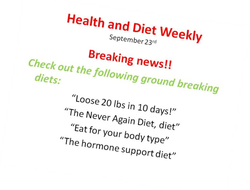Scepticism, nutrition guidelines, research, food trends, and controversies
Published: February 09, 2023
Scepticism
We all eat and have opinions about food and what is good for us, and what is not.
For many of us these opinions are the result of personal experiences with food based on social, cultural, spiritual, and economic factors.
We often share our opinions with family and friends,
However, many people now share their opinions of healthy food on social media where they become incorporated into the melting pot of nutrition advice.
Often the voices of the least well informed overcome the voices of the well informed.
The notion that nutrition advice be supported by scientifically investigated evidence is supplanted by personal beliefs.
It is often the way in which research is presented that may lead you, the consumer, to receive the message as truth.
Think about TV talk shows that are hosted by “doctors”.
As it turns out, less than 50% of the recommendations made on these show provide sufficient information about the benefits of the product or the size of the effects of those benefits.
Of the evidence that is provided most is contradicted by the best available evidence and conflicts of interest are seldom discussed.
The same can be said for diet and “healthy” eating books.
Some books provide facts to support the rationale behind the diet, but often these facts come from research which has been poorly interpreted. The end result is, at best, half-truths.
However, people are often sceptical of, and/or reluctant to accept healthy eating recommendations coming from government health authorities.
This is not totally surprising as nutrition and health research sometimes reveals contradictory findings.
Technological improvements, nutrition interventions, and increased nutrition research provide us with greater insights into nutrients and the beneits or otherwise of various foods.
Sometimes foods or nutrients that were once highly recommended suddenly appear...follow the link to the full article.

